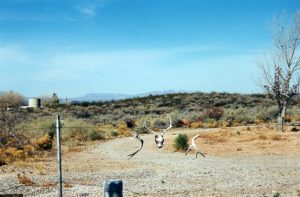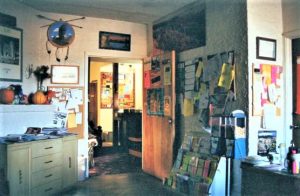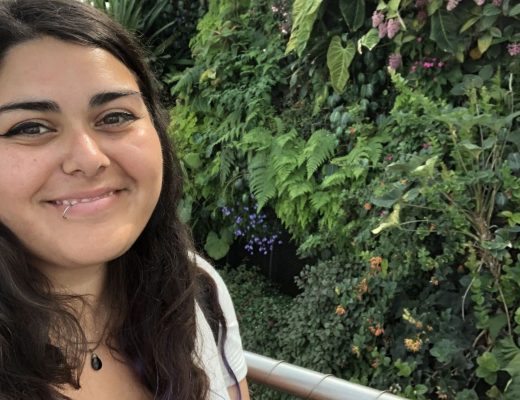 What to Eat When You Are Rich
What to Eat When You Are Rich
I spat out a slice of fresh tomato one morning in Honolulu. That was how my journey to New Mexico began in the late 1990s. I didn’t feel sick, but no solid food would go down. I was hungry. I tried to eat bread, but my tongue pushed it back. I attempted to force down a leaf of lettuce with tea, but it stuck to my palate. I rushed to the phone to call Lynn, a masseuse in Honolulu I’d met a few months before through our mutual friend.
Although her trade was to relax her clients’ muscles, her knowledge went beyond that. When I mentioned I’d just gone on the pill because I had terrible cramps, she frowned.
“If you have a vulnerable womb, that means you aren’t good at expressing your emotions. Going on the pill won’t solve your problem.”
She was correct in assessing other physical problems I’d had before (“Pimples on the neck? You thought you were in an unfair situation, didn’t you?”). So, when my instinct told me that doctors couldn’t help the problem I had that morning, I turned to Lynn.
“Don’t eat anything,” she said in her usual breezy tone. “You can survive on water for at least a week.”
“But I could drink tea…”
“You shouldn’t. Just water. With some lemon juice if you’d like.”
I said okay and hung up.
I dutifully limited my diet to water. I felt hungry, but I learned that hunger and appetite were not always connected. I was a college student, and I attended classes and worked on assignments just fine. For the most part, consuming nothing but water brought sweet sluggishness. At home, I would lie down in bed, and listen to the rustling of hibiscus leaves outside the window. With my stomach empty, my body felt like hollow dough sinking into a cooler, quieter, and comfortably darker place than anywhere I’d ever experienced.
I was a chunk of problems smashed together at the time. I lived in fear of finding my bank account empty each time I paid the rent. Graduation was approaching, but, for an international student with a BA in English and without permanent residency, prospects for employment were bleak. Returning to Japan was an option, but I couldn’t cough up the airfare. The not-so-wholesome relationship I’d recently gotten out of left me bitter at myself. Despite all these, I tried to stay—or act—strong by telling myself I was all right. As part of this pathetic attempt, I chose to eat well to survive in good health. Then my body refused food.
As I lay in bed and watched the shadows of the blinds sway on the white ceiling, all these worries receded.
After one week, Lynn called to offer me a one-hour massage. As soon as I set down the receiver, tears rolled down my cheeks. I realized I hadn’t cried for ages.
The massage was more painful than revitalizing, as Lynn pushed and pulled my limbs. She said the energy lines that should run diagonally from my shoulders to my hipbones were arching toward my throat, blocking the passage for food.
“You have too strong an idea about how you should carry yourself. That’s the workings of your ego,” she said. “In the human body, the throat represents the ego.” Then, while I sat speechless on her portable cot, she said we should go to lunch.
At the vegetarian buffet served by barefoot Buddhist monks in pale yellow robes, I went back to the counter for a second serving of fried vegetables and noodles seasoned with herbs I’d never smelled before. Looking out the windows at the lush steep mountains of Hawaii, I ate the first meal in a week in silence. The act of eating had never felt so natural.
Although I didn’t transform into a vegetarian, my diet became heavily plant-based. My American roommates teased me that I looked like a rabbit munching on lettuce, carrots, mushrooms, broccoli and cauliflower. Tofu and eggs became the main source of my protein. This continued into my working life after graduation. I managed to get four part-time jobs in different parts of Honolulu. I travelled by bus and on foot from one end of the city to the other every day, exposing myself to its varied cityscapes and landscapes of perpetual summer. I noticed that the fasting had sharpened my senses. The sky, the glinting ocean, and the red and yellow hibiscuses glowed so intensely they stung my eyes. My ears caught the rustling of palm fronds in the midst of traffic when it wasn’t windy. At a bustling marketplace in a valley, I smelled the scent of trees carried on the mist from the mountains. I heard silence over a hum of people’s chatter wherever I was.
With the sharpened senses came dreams and daydreams. In my sleep, I saw a vast land and huge mountains infused with flaming red and orange. While I ambled on the seaside street toward the office, I had flashes of a blue sky with wispy clouds that was not Hawaii’s, and caught whiffs of an arid land devoid of verdant landscapes.
Then I found myself sickened as I opened my apartment door each morning to inhale sweltering tropical heat that draped over me. One day, I drifted into a large bookstore and browsed shelves stacked with travel guidebooks. I found photographs of the sky and the wilderness I’d seen in my reveries in travel guides for New Mexico. Less than two months later, I quit all my jobs and booked a one-way flight to Albuquerque.
***
 My neighborhood grocery store in New Mexico sold basketfuls of dry beans in different colors. The sight was as exotic to me as sushi served on a conveyor belt might be to non-Japanese. On my first visit to the grocery, it took me almost an hour to walk through the aisles, looking at Mexican staples like tortillas, only to end up buying familiar foodstuffs, like broccoli, zucchini, and brown rice.
My neighborhood grocery store in New Mexico sold basketfuls of dry beans in different colors. The sight was as exotic to me as sushi served on a conveyor belt might be to non-Japanese. On my first visit to the grocery, it took me almost an hour to walk through the aisles, looking at Mexican staples like tortillas, only to end up buying familiar foodstuffs, like broccoli, zucchini, and brown rice.
I was on a tighter budget than ever. During the first month, I fared well with the bare minimum. A suitcase of well-worn clothing and a leather jacket donated by Lynn were all I owned in the world. I slept in a hostel that had a kitchen stocked with free food for guests, such as cereal, bread, and potatoes. After a day of loafing in town, I cooked in the quiet of the late afternoon, inhaling the chilly air with its faint smell of rosemary. The clang of pots and pans and the sizzle of sliced vegetables made me appreciate I could stave off hunger for another day. I didn’t think about why I was in Albuquerque and what I would do. Nor did I wish for more than what I had, but more came around: new friends, my own little studio, a temp office job that barely paid my rent.
I often walked to the Rio Grande in the evening to view the sunset. Burning yellow and crimson suffused the sky, and reddish purple swept through the rocky Sandia Mountains. I would stand by the river that soundlessly flowed and eddied until it was almost completely dark, then stride back through the deserted streets, the cold crisp air on my cheeks that I had first whiffed in my Honolulu daydreams. I didn’t share this sunset ritual with anyone, even after I got to know Frank and James, new friends who eventually felt like family.
Frank and James worked at the hostel where I’d stayed those first few weeks. After work and on weekends, I would climb up the long stone staircase to the back door of the hostel to hang out with them upstairs, toting groceries in a plastic bag to cook my dinner in the employee kitchen. Here, in a space cluttered with unwashed dishes and cutlery, I would often find Frank reading a book in the corner, smoothing his long beard and moustache, the fuzz on his shaven head visible against the sun-lit window. There in the kitchen, he ate macaroni and cheese from the pot. “It saves time and water,” he said. I seldom saw James cooking. He would show up from nowhere when I set about cooking, his shaggy dark brown hair tucked under a red bandana, and chop vegetables for me into sizes larger than I wanted, later sharing my meal.
I concocted dishes that used what few ingredients I could afford to buy—curry made with butter and flour, carrot and broccoli soup topped with toast and powdered cheese, fried onions and potatoes wrapped in flour tortillas. I threw these experimental foods into a Ziploc container for lunch and ate them in a small churchyard near the office. Somewhere in the quiet and sun-filled neighborhood, a little girl occasionally called out, “Lemonade, cold lemonade!”
Although I succeeded in creating a wider variety of dishes, that didn’t mean I always had enough to fill my stomach. I was constantly hungry, and sometimes wished I could afford to eat more. James, also with a chronically empty stomach, would now and then sneak a slice of bread for me from the shelf of free food. He and I sometimes went to the library together, and on our way back, we shared a large chocolate chip cookie or a cup of café au lait with cream on top. One evening, Frank, James, and I went to the movies and then walked more than two miles back to our neighborhood. I don’t remember why we didn’t take the bus when we hadn’t eaten for hours. Frank was so hungry he tried to get a burger at a McDonald’s drive-through, only to be refused for being on foot. But we walked anyway, gladly, along old Route 66, which gently sloped toward downtown, lifting into our view the city lights sweeping across the desert.
As months went by, Frank and James befriended more and more hostel guests who had relocated to Albuquerque. Every week someone threw a party, where clothing the host had salvaged from dumpsters often piled in a corner. I sometimes picked a piece or two from the mounds, and joined the crowd around a table of pasta, salad, hummus, chips, and fried rice. Maureen, one of the frequent party throwers, made fantastic French fries from potatoes that had begun to feel soft to the touch, and she served heaps of steaming enchiladas drowned in red chili sauce and sour cream. At her duplex, we talked and danced late into the night, as her kittens skittered across the kitchen chasing roaches. In her small backyard, we huddled around a small fire pit, roasting marshmallows skewered on long twigs.
As the scorching and stormy Southwestern summer passed, some of us began to talk about leaving. When the air took on a chill and my work permit expired, I took it as a sign to move on.
***
 I moved back to Tokyo that fall and took on temp translation jobs. In the office, people talked about what food they felt like eating for lunch: Japanese, Italian, French, Chinese, Korean, Thai, Indian, Vietnamese. Japanese restaurants can be further divided into eateries featuring buckwheat noodles, flour noodles, rice bowl dishes, cutlets, sushi, and set-meals consisting of fish and rice and miso soup. In the beginning, I enjoyed the variety, but the enjoyment I got from this wealth of choices never brought the satisfaction I’d gained from improvising a variety of dishes from limited ingredients.
I moved back to Tokyo that fall and took on temp translation jobs. In the office, people talked about what food they felt like eating for lunch: Japanese, Italian, French, Chinese, Korean, Thai, Indian, Vietnamese. Japanese restaurants can be further divided into eateries featuring buckwheat noodles, flour noodles, rice bowl dishes, cutlets, sushi, and set-meals consisting of fish and rice and miso soup. In the beginning, I enjoyed the variety, but the enjoyment I got from this wealth of choices never brought the satisfaction I’d gained from improvising a variety of dishes from limited ingredients.
In addition to international restaurants, Tokyo abounds with imported food stores, and the Internet has put almost any exotic food or spice within my reach. I can get a bag of ten tortillas for about four dollars, for instance. Not bad. But I know I can never make the same tacos I invented in Albuquerque, where I bought a bag of twenty tortillas for a few dollars, even if I use exactly the same ingredients.
Now, twenty years later, professionally and financially better off, I live in a spacious apartment in the suburbs of Tokyo. I replenish my fridge whenever I want and cook whatever I want using any seasonings I need, like nutmeg, clove, or cumin—additions I dismissed as “extravagances” when I saved pennies. My wardrobe remains limited, although none of the clothes are threadbare or from dumpsters. Non-groceries I buy are mostly consumables because my living space is already complete with everything I need.
I still see visions of unfamiliar places and smell their exotic scents, but they vanish before I can identify where they are. I still hear silence over urban noise, though the frequency has diminished. I never choke back my food anymore, and I have lost touch with Lynn.
I don’t regret leaving New Mexico. I knew I couldn’t live that way forever. I knew there would be something for me to do after those freewheeling days, something I was meant to do, and that the something would push me along a path more arduous than pennilessness in youth and I’d stay the course. Then there would be no going back. Nevertheless, I occasionally gravitate toward emptying my fridge to live on a diet of meager meals for a week or two—just to remind myself of how delectable such foods were when I was at my richest.
Kaori Fujimoto is an essay writer and freelance translator based in the Tokyo area. She was a fellow of the Paris American Academy Creative Writing Workshop. Her work has appeared in Brevity, Cleaver, South Loop Review, Sliver of Stone, Talking Writing, and Peacock.

